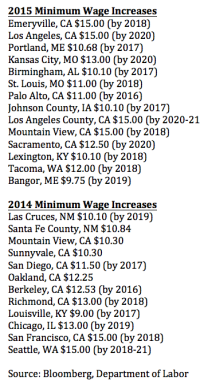We’ll Find Out Soon If Higher Minimum Wages Kill Jobs
But don’t jump to conclusions before the data are in.
Bloomberg, March 4, 2016
 Today’s jobs report confirms much of what we already know: Workers are finding employment at a steady but unspectacular rate, private-sector job creation is good but not great, hours worked are ever so slowly ticking up and wage increases are pretty much nonexistent.
Today’s jobs report confirms much of what we already know: Workers are finding employment at a steady but unspectacular rate, private-sector job creation is good but not great, hours worked are ever so slowly ticking up and wage increases are pretty much nonexistent.
This got me thinking about the push to increase minimum hourly wages and the demands for a $15 national floor. Although the national $15 minimum probably will go nowhere, given the opposition it faces, there’s been lot of movement at the state and local levels as the table below indicates.
As we can see, plenty of areas either already do or will soon pay a good deal more than the federal minimum of $7.25 an hour. Some municipalities and employers have adopted wage increases, often phased in over several years, because they believe it’s a matter of fairness or that social justice demands it. That’s fine, as far as it goes. However, more and more businesses have a different perspective: a tightening job market is making it harder to attract and retain quality employees, so raising minimum pay is often simply a practical matter. Limiting costly employee turnover and keeping your best workers makes good business sense.
All of this gives us the opportunity to watch a great economic experiment unfold before our eyes. It might help us answer questions about whether minimum wages cost jobs, hurt profits and crimp economic growth.
It’s no surprise that some are opposed to these increases. After all, goes the argument, the market is much more efficient at determining appropriate wage levels than any government bureaucrat or politician. Some critics of these raises, however, are jumping to conclusions about increases without waiting for the evidence — or even for the high wages to go into effect.
The obvious fact is it’s way too early to draw any hard conclusions. McDonald’s, which has boosted pay for some minimum-wage employees, just reported pretty decent earnings. But this doesn’t mean much of anything in the minimum-wage debate. The pay increases applied to McDonald’s company-owned stores, although most restaurants are owned by franchisees. What’s more, McDonald’s new all-day breakfast menu was a hit at a time when competitor Chipotle stumbled after repeated outbreaks of food-borne illness.
Another company that’s raising minimum wages, Wal-Mart, just reported earnings that were better than expected. Its stock has risen about 20 percent since it announced its wage increase for U.S. stores late last year — and despite the $4 billion price tag. Investors don’t seem to be too concerned that higher pay for workers is hurting earnings.
As for employment in cities, there is little hard evidence to date that job growth has slowed in areas where minimum wages have risen. There have been numerous attempts to read the data as if it has hurt employment, but so far none of the research is persuasive (see thisand this).
Given how low unemployment is now — there’s plenty of anecdotal evidence that service industries are having trouble finding workers — we shouldn’t be surprised that raising the minimum wage isn’t the death knell for the economy.
As I have noted before, higher minimum wages transfer wealth from shareholders and business owners to workers. But they do something else. When lower-income workers get raises — especially those receiving minimum wages — they will spend almost all of it. That increase in consumer spending stimulates the economy. By comparison, the well-off are much less likely to spend each additional dollar of income and are more likely to save it. Although that might boost the pool of investment capital, it does little to boost the economy short term.
The real test will come when the U.S. slips into recession, as it inevitably will. That might reveal whether a higher minimum wage acts as a safety net for low-wage workers — or prevents them from getting jobs during a slowdown.
I suspect that during the next five years, we will have tons more data from all of these experiments in raising the minimum wage. My hunch is that the increases won’t hurt much because putting more money in the pockets of those who spend almost everything they make is a pretty good economic stimulus.
We should pay close attention to what this grand real-world laboratory experiment reveals.
Originally: We’ll Find Out Soon If Higher Minimum Wages Kill Jobs


What's been said:
Discussions found on the web: